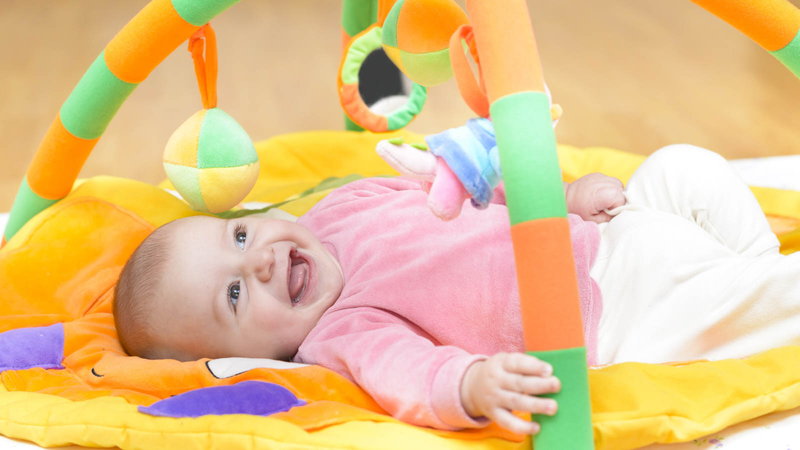
Your baby will turn six months old at the end of this month. Most babies will double their birth weight by the end of this month. If your baby hasn’t doubled her weight yet, you may want to discuss this with your pediatrician at her six month check up. By the end of this month, your baby will weigh somewhere between 16 and 17 lbs, and measure around 26 to 26 ½ inches in length. She may still be gaining at the pace of about 4-7 oz per week and growing ½ inch to an inch a week. However, this is around the time her weight and growth pattern slows down. At six months, babies’ growth rates slow down to about 1 lb of weight gain a month and about a half inch growth in length per month. This means your baby’s growth will likely start to slow down soon, if it hasn’t already.
Your baby is making progress developmentally in so many ways. She is now rolling over from front to back and back to front. She can reach for toys, and she might even be sitting up by herself now. If she is not sitting up independently yet, she should be able to do it briefly or with a little assistance. To help him get better with sitting, try propping him in the corner of a couch with supervision or use a boppy pillow to give her some extra support while she practices sitting.
Her sleeping routine should have improved considerably by now. She should be sleeping for 6 hour stretches or longer now. If your baby is not sleeping through the night now, this is nothing to worry about, but there are some things you can do to encourage her to sleep better. If your baby doesn’t have a daytime routine, you can work on getting her into a regular routine for eating and sleeping. Being awake and active during the day should help her to sleep better at night. You may want to take a look at her feeding routine as well. If she is taking feedings at night, you will want to work on gradually weaning her from her night time feedings.

You may be anxious to offer your baby solids. Six months is about the right time to start feeding your baby solid foods. At this time, most babies have lost their tongue-thrust reflex (pushing food back out with their tongue), and their digestive systems are more prepared for handling solids than they were just a month ago. There are a couple of approaches to starting solids. Most moms start off by offering single-grain cereals like rice or oatmeal and single ingredient pureed fruits and veggies like apples, pears, carrots, and sweet potatoes. However, other moms take an entirely different approach and skip jarred and pureed foods altogether. This approach is called baby led weaning and works well with babies that are six months or older. With baby wed leaning, babies are offered real foods, not purees, such as avocado, banana, or steamed sweet potatoes.
She is getting smarter with everything. She continues to improve on her babbling skills. You may hear her stringing consonant and vowel sounds together frequently, such as “ma-ma-ma” or “da-da-da.” In the next few months, she will be able to produce more complicated sounds, like stringing two different consonants and vowel sounds together.
By the End of the Sixth Month Your Baby Can:
- Hold her own bottle
- Roll over in both directions
- Wave her arms when she wants to be held or picked up
- Respond to her own name
- Drop toys to pick up another toy
- Get mad when a toy is taken away from her
- If placed on a kick and play mat, kick her feet at the toy
- Recognize himself in the mirror
- Look for object or toy that has fallen to the ground
Your Baby Likes:
- To listen to sounds or music
- To touch objects and put them in her mouth
- To smile at herself in the mirror
- To giggle and laugh
- To play with others, especially mommy and daddy
- To imitate mommy and daddy’s facial expressions or sounds
Safety Tips:
- If you haven’t already, move household cleaners into locked cabinets.
- Install latches on cabinet doors and drawers.
- Keep alcoholic beverages locked up.
- Keep emergency contact phone numbers available and in an easy to find place.
Activities For Your Baby:
- Play a game of tickle my toes. Babies love to play games. Try teaching her about where different body parts are by playing a game of tickle my toes. Start by telling her you are going to tickle her toes. Then tickle her toes gently and choose another body part. “Mommy is going to tickle your tummy now.” And, next tickle her tummy.
- Dance with baby. Turn on your baby’s favorite music and dance with her. Babies love to dance. This will give you some cuddle time with your baby and help you to bond with your baby.
- Read a sensory book with baby. Get a book that has lots of fabrics and textures. Let your baby touch and feel the book as you read it.

